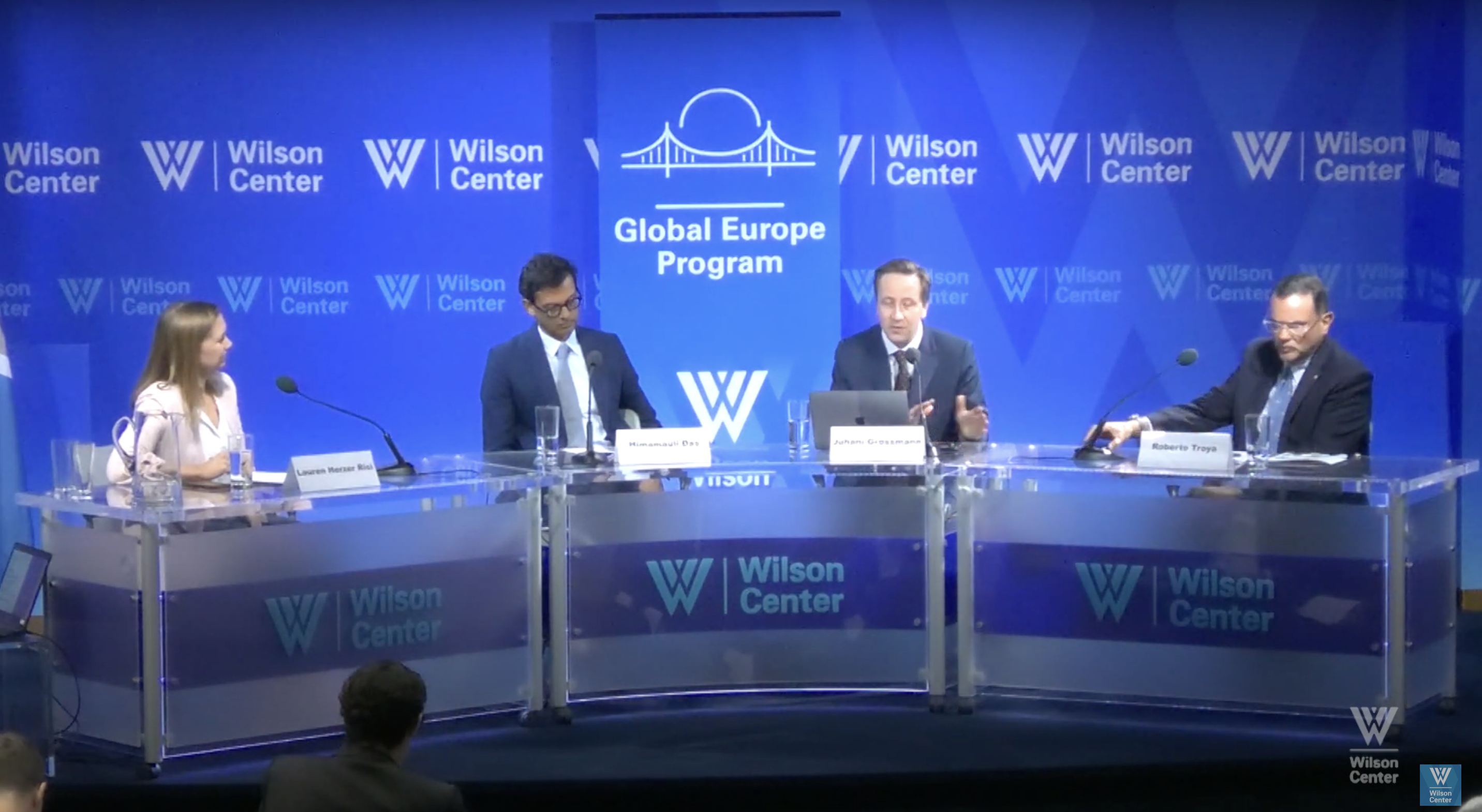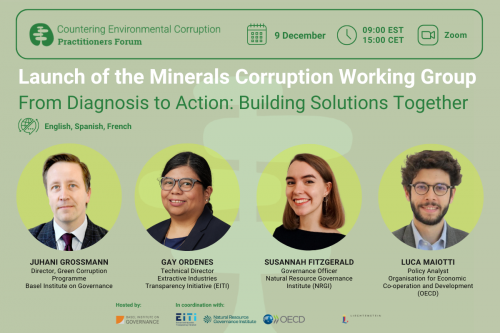Progress in fighting green corruption – and the path ahead

“Fighting climate change and the degradation of our planet is hard enough. We cannot allow poor governance and corruption to undermine our hard-fought progress.”
– Ambassador Georg Sparber, Ambassador of Liechtenstein to the United States
Speakers at a high-level event at the Wilson Center in Washington, D.C. noted substantial strides in addressing “green corruption” in recent years. Though awareness, understanding and action on corruption and illicit financial flows linked to environmental degradation are growing, further progress is needed. That will entail the active cooperation of governments, the private sector and civil society across the world.
That is no small challenge, but the tone of the event on 19 September 2023 was optimistic and forward looking. Organised by the Embassy of Liechtenstein to the U.S., the U.S. Department of State, the Wilson Center and the Basel Institute on Governance, the event featured:
- Richard Nephew, Coordinator on Global Anti-Corruption, U.S. Department of State
- Oleksandra Azarkhina, Deputy Minister for Communities, Territories and Infrastructure Development of Ukraine
- Andrea Gacki, Director of FinCEN
- Himamauli Das, Former Acting Director of FinCEN
- Roberto Troya, Senior Vice President for WWF U.S. country offices and Regional Director for Latin America and the Caribbean, WWF
- Juhani Grossmann, Team Leader for the Green Corruption programme, Basel Institute on Governance
- Lauren Herzer Risi, Director of the Environmental Change and Security Program at the Wilson Center (moderator)
The high level of attendance in person and online was a positive sign that stakeholders in all sectors of society are starting to take the issue seriously.
Growing attention
As Coordinator Nephew stated in a keynote speech, green corruption links three key priorities of the U.S. Government: the green economy, nature crimes and fighting corruption. Addressing it will remain a prime concern across U.S. institutions, he said.
Other countries are also joining the dots between corruption, transparency and environmental sustainability. The Basel Institute’s Green Corruption programme has noted a growing openness among governments and their environmental agencies to address the topic. This is a welcome development, even if getting under-resourced environmental agencies to focus on internal corruption risks remains a challenge.
In Ukraine recent crimes that could amount to ecocide, such as the blowing up of the Kakhovka Dam, have drawn attention to how kleptocratic regimes can deliberately destroy nature to achieve their military and geopolitical goals. On the other side, as Deputy Minister Azarkhina explained in her presentation, the Ukrainian Government’s restoration plans are based on a powerful recognition that environmental considerations, transparency, accountability and citizen participation are all vital to their success.
Environmental crime is also rising up the priority list of financial institutions and government financial intelligence units, such as the U.S. Financial Crimes Enforcement Network (FinCEN). As Andrea Gacki pointed out, FinCEN’s 2021 report on illicit finance threats involving wildlife trafficking joins other milestone reports such as those of the Financial Action Task Force in drawing attention to the issue of illicit financial flows linked to environmental crimes.
The increased attention has led to a paradigm shift, as moderator Lauren Herzer Risi said, from focusing on the middlemen to targeting the transnational criminal organisations masterminding nature crimes – and to the public officials that abuse their power to facilitate these crimes for personal gain.
Leaps in understanding
The USAID-funded Targeting Natural Resource Corruption project has added meat to the concept of green corruption with its deep, detailed and actionable research on the links between corruption and natural resource-related crimes. Favouring ground-level, practical information and aimed at a broad audience of conservation and anti-corruption practitioners, the project has helped to connect individuals and organisations targeting nature crimes from both conservation and anti-corruption angles.
This shared knowledge will keep growing with the Countering Environmental Corruption Practitioners Forum, a joint initiative of WWF, TRAFFIC, Transparency International and the Basel Institute on Governance. With funding support from USAID and Liechtenstein, the Forum is already serving as a powerful platform for practitioners at all levels to share knowledge and experiences on tackling green corruption.
A similar swell of understanding is taking place in the anti-money laundering/counter financing of terrorism (AML/CFT) sphere. A 2021 FinCEN Exchange brought together representatives from U.S. financial institutions, law enforcement and Federal Government agencies to discuss environmental crimes and related financial activity. Other information-sharing initiatives include the new U.S.–South Africa Task Force to Combat the Financing of Wildlife Trafficking as well as the international Egmont Group of Financial Intelligence Units.
Actions and coalitions
So, what is being done as a result of this groundswell in attention and understanding?
On the enforcement side, prosecutions and sanctions for corrupt officials linked to environmental crimes send a clear message. Both suspicious transaction reports and whistleblowing reports can be useful in triggering law enforcement actions targeting corruption or illicit financial flows linked to nature crimes, while the dangers for whistleblowers and environmental activists need to be taken very seriously.
For prevention, countries should systematically build anti-corruption elements into green economy and climate-related projects, as Coordinator Nephew said the U.S. is doing. In this, countries could take inspiration from Ukraine’s reconstruction planning, which makes the most of digital technologies like ProZorro and the DREAM platform to enhance transparency and engage citizens in ensuring accountability. Other promising ideas are set to emerge shortly from the U.S.-led Powering a Just Energy Transition Green Minerals Challenge.
Ultimately, as Ambassador Sparber said, countering green corruption is a whole-of-society effort. That is why partnerships and coalitions will play a key role in keeping up momentum on awareness, understanding and action. In addition to the Countering Environmental Corruption Practitioners Forum, powerful coalitions include the Extractive Industries Transparency Initiative, the Minerals Security Partnership and the Nature Crime Alliance.
We welcome these partnerships and the continued support of forward-looking donors and institutions seeking to safeguard our planet’s future from corruption.
Together, we will continue to keep pushing the issue of Green Corruption to the top of the agenda of global policymakers and practitioners – including at the forthcoming intergovernmental Conference of the States Parties to the UN Convention Against Corruption in December in the U.S. city of Atlanta.
Learn more
- Watch the full event recording and see key quotes from speakers or view the individual speeches and panels
- Sign up to be notified of future events and publications on Green Corruption



